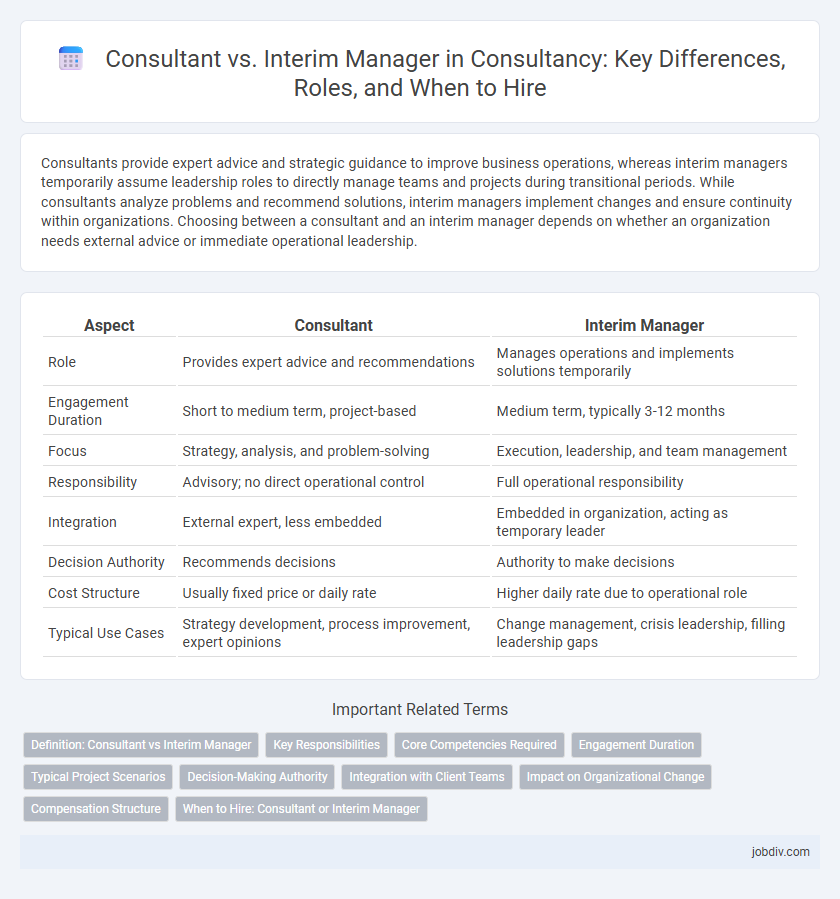Consultants provide expert advice and strategic guidance to improve business operations, whereas interim managers temporarily assume leadership roles to directly manage teams and projects during transitional periods. While consultants analyze problems and recommend solutions, interim managers implement changes and ensure continuity within organizations. Choosing between a consultant and an interim manager depends on whether an organization needs external advice or immediate operational leadership.
Table of Comparison
| Aspect | Consultant | Interim Manager |
|---|---|---|
| Role | Provides expert advice and recommendations | Manages operations and implements solutions temporarily |
| Engagement Duration | Short to medium term, project-based | Medium term, typically 3-12 months |
| Focus | Strategy, analysis, and problem-solving | Execution, leadership, and team management |
| Responsibility | Advisory; no direct operational control | Full operational responsibility |
| Integration | External expert, less embedded | Embedded in organization, acting as temporary leader |
| Decision Authority | Recommends decisions | Authority to make decisions |
| Cost Structure | Usually fixed price or daily rate | Higher daily rate due to operational role |
| Typical Use Cases | Strategy development, process improvement, expert opinions | Change management, crisis leadership, filling leadership gaps |
Definition: Consultant vs Interim Manager
A consultant is a specialized expert who provides strategic advice and solutions to organizations on specific projects or challenges, often offering an external perspective without operational authority. An interim manager temporarily assumes internal leadership roles within a company to manage transitions, crises, or restructuring, holding direct decision-making power and accountability. Both roles address organizational needs but differ primarily in scope of responsibility, authority, and duration of engagement.
Key Responsibilities
Consultants analyze business challenges and provide expert recommendations to enhance strategy, processes, and performance, while interim managers take on active leadership roles to implement changes and manage daily operations during transitional periods. Consultants focus on delivering insights and frameworks, whereas interim managers are responsible for decision-making, team management, and achieving short-term organizational goals. Both roles require expertise, but the interim manager engages directly in operational execution compared to the advisory nature of consultants.
Core Competencies Required
Consultants excel in analytical thinking, problem-solving, and strategic advisory skills, enabling them to diagnose issues and recommend tailored solutions across various industries. Interim managers require strong leadership, operational expertise, and change management abilities to take direct responsibility for executing projects and leading teams during transitional periods. Both roles demand excellent communication skills, but interim managers prioritize hands-on decision-making and team integration, while consultants focus on delivering actionable insights and frameworks.
Engagement Duration
Consultants typically engage on a project basis with a defined scope lasting from a few weeks to several months, providing specialized expertise and recommendations. Interim managers are appointed for longer durations, often several months to over a year, to fill leadership gaps and drive ongoing operational performance. The extended engagement of interim managers allows for hands-on management and implementation, while consultants focus more on strategic advice within shorter timeframes.
Typical Project Scenarios
Consultants typically engage in strategic assessments, offering expert advice and actionable recommendations during project initiation or transformation phases. Interim managers are deployed to fill leadership gaps, driving operational execution and managing teams in high-pressure, time-sensitive scenarios such as organizational restructuring or crisis management. Both roles complement each other by blending strategic insight with hands-on management to ensure project success.
Decision-Making Authority
Consultants provide expert advice and strategic recommendations without holding formal decision-making authority within the client organization, influencing choices through analysis and guidance. Interim managers assume full decision-making authority and operational control during transitional periods, directly implementing strategies and managing teams. This distinction impacts organizational agility, with interim managers driving immediate change while consultants shape long-term direction.
Integration with Client Teams
Consultants bring specialized expertise and often work independently to provide strategic advice, focusing on high-level problem-solving without direct involvement in daily operations. Interim managers integrate fully into client teams, assuming leadership roles to drive execution and manage change within the organization. This hands-on approach enables interim managers to align closely with internal workflows and culture, fostering smoother transitions and immediate impact.
Impact on Organizational Change
Consultants provide expert analysis and strategic recommendations that guide organizational change by identifying challenges and proposing tailored solutions. Interim managers assume direct leadership roles within the organization, driving change through hands-on management and immediate decision-making authority. Their impact is distinguished by consultants influencing from an external perspective, while interim managers effect change internally by executing plans and managing teams during transition periods.
Compensation Structure
Consultants typically receive fixed fees or hourly rates based on project scope, emphasizing deliverables and advisory expertise, while interim managers secure salary-based compensation aligned with executive responsibilities and operational management during transitional periods. Consultant compensation often includes performance bonuses linked to specific outcomes, whereas interim managers may benefit from contractual incentives reflecting company performance and leadership impact. Understanding the distinctions in compensation structures is crucial for organizations to align costs with strategic objectives and operational needs.
When to Hire: Consultant or Interim Manager
Hire a consultant when specific expertise or strategic advice is needed to solve complex business challenges or implement specialized projects. Engage an interim manager to fill a temporary leadership gap, drive change, or manage operations during transitional periods. Choosing between the two depends on whether the priority is external advisory support or hands-on management and accountability.
Consultant vs Interim Manager Infographic

 jobdiv.com
jobdiv.com